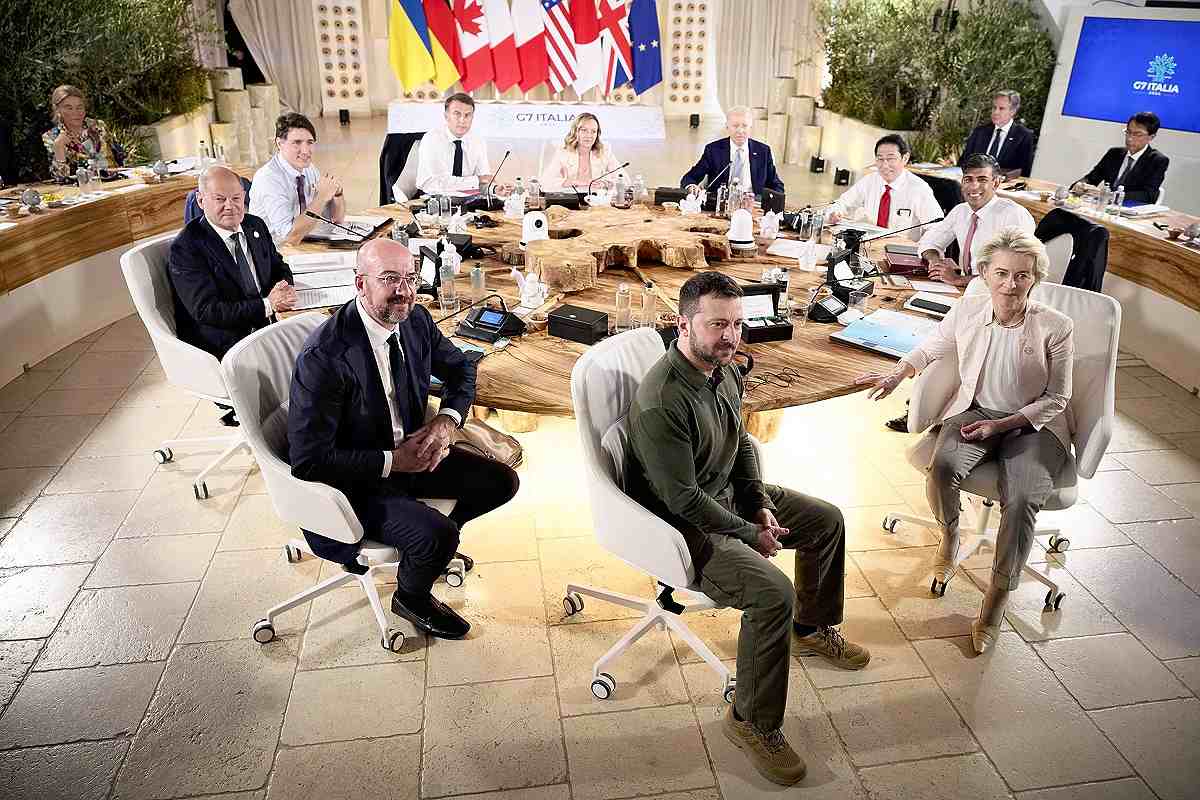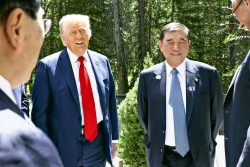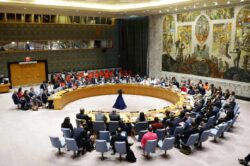
Ukrainian President Volodymyr Zelenskyy, front center, joins a discussion on Russia’s invasion at the G7 summit in Italy on Thursday.
17:05 JST, June 15, 2024
BARI, Italy — Aiming to weaken Russia’s military, the Group of Seven major industrialized nations have taken steps to counter China, which is indirectly supporting Russia’s continued assault on Ukraine.
On Friday, the second and final day of the G7 summit in Italy, the leaders spent as much as 90 minutes discussing economic security and the Indo-Pacific region. As the confrontation between China and Russia on one side and liberal countries on the other becomes sharper, the G7 is being tested.
Leaky sanctions
“China is not supplying weapons but the ability to produce those weapons and the technology available to do it. So, it is, in fact, helping Russia,” said U.S. President Joe Biden at a press conference on Thursday.
Despite export restrictions and sanctions against Russia by Japan, the United States and countries in Europe, semiconductors and electronic components that can be used for military purposes continue to flow into Russia through third countries.
Chinese companies are key to this flow. Since sources for civilian goods that can be turned to military use are restricted by the G7, around 90% of Russia’s imports for such goods came from China in 2023, according to research by the Carnegie Endowment for International Peace, a policy research institute.
Before the G7 summit, a senior U.S. government official expressed serious concern, saying that China has increasingly become Russia’s military factory.
At the summit, the G7 leaders shared their concerns about these issues and confirmed that the G7 as a whole opposes them. They also agreed to strengthen sanctions against China. For its part, the United States unveiled sanctions against more than 300 individuals and groups, including those in third countries such as China. Japan said it would join the sanctions targeting China.
With more than two years having passed since Russia’s invasion of Ukraine, Western countries have begun to show “donor fatigue.” As U.S. support stalls, Kyiv is running low on ammunition and being forced to retreat.
Meanwhile, Russia has grown closer to “anti-U.S. and anti-European” forces, such as North Korea and Iran, and switched to a strategy of wearing Ukraine down.
Behind the G7 leaders’ decision to play the sanctions card against China now is a sense of crisis over Ukraine growing worse off the longer Russia’s aggression drags on. The summit has become a venue for the G7 to demonstrate their resolve for a prolonged war.
The G7 leaders reached a basic agreement on providing a massive loan of $50 billion (about ¥7.8 trillion) to Ukraine using frozen Russian assets by the end of this year. The United States and Japan both signed 10-year security agreements with Ukraine, on the sidelines of the summit.
Uncertainty
Of course, any commitment to long-term assistance for Kyiv could be swayed by domestic politics.
In the United States, it is unclear whether Biden will be reelected. The country’s support for Ukraine may weaken if former President Donald Trump, who advocates an “America First” policy, is elected in the presidential election in November.
Trump also said this year that he would encourage Russia to do “whatever the hell they want” to any NATO member country that does not spend enough on defense.
The G7 leaders’ insistence on making use of frozen Russian assets “by the end of this year” is aimed at ensuring the loans would be made before Trump takes office if he is elected.
The 10-year security agreement that the United States signed with Ukraine can be rescinded if Washington notifies Kyiv in writing six months in advance. Trump could even cancel the agreement unilaterally. In truth, there is no guarantee the G7 pledge of long-term support for Ukraine will remain firm.
Top Articles in Politics
-

Japan PM Takaichi’s Cabinet Resigns en Masse
-

Sanae Takaichi Elected Prime Minister of Japan; Keeps All Cabinet Appointees from Previous Term
-

Japan’s Govt to Submit Road Map for Growth Strategy in March, PM Takaichi to Announce in Upcoming Policy Speech
-

LDP Wins Historic Landslide Victory
-

LDP Wins Landslide Victory, Secures Single-party Majority; Ruling Coalition with JIP Poised to Secure Over 300 seats (UPDATE 1)
JN ACCESS RANKING
-

Japan PM Takaichi’s Cabinet Resigns en Masse
-

Japan Institute to Use Domestic Commercial Optical Lattice Clock to Set Japan Standard Time
-

Israeli Ambassador to Japan Speaks about Japan’s Role in the Reconstruction of Gaza
-

Man Infected with Measles Reportedly Dined at Restaurant in Tokyo Station
-

Videos Plagiarized, Reposted with False Subtitles Claiming ‘Ryukyu Belongs to China’; Anti-China False Information Also Posted in Japan





















